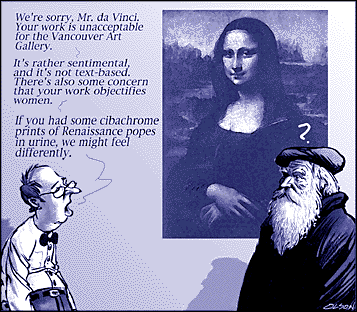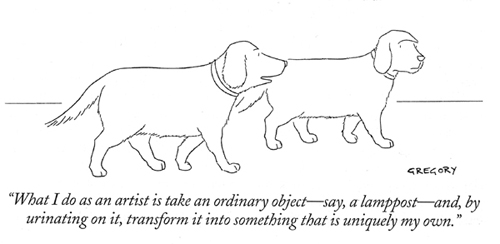Critical Writing
Harold Rosenberg
(From Criticism and its Premises)
In art, the prime history-makers are painters and sculptors. As indicated earlier , there are writers and cultural commissars who wish to appropriate this privilege of the artist and to use him as an instrument for their own art-history-making. The result is a new kind of conflict - between the artist and the professional representatives of his public.
Art criticism today is beset by art historians turned inside out to function as prophets of so-called inevitable trends. A determinism similar to that projected into the evolution of past styles is clamped upon art in the making. In this parody of art history, value judgments are deduced from a presumed logic of development, and an ultimatum is issued to artists either to accommodate themselves to these values or be banned from the art of the future. An aesthetician founded on art history wields a club of dogma similar to moralistic criticism in the nineteenth century or political criticism in the Soviet Union.
Dead art movements are the normal life of art; all that can be expected of them is good painting.
In regard to creation there is nothing to indicate that a new art movement has any advantage over an obsolete one; the contrary may well be the case.
After 1972 anyone could be an artist, except, perhaps, painters and sculptors.
No degree of dullness can safeguard a work against the determination of critics to find it fascinating.
Rosenberg on Museums and their Acquisition Policies:
Moreover, its new position of power led the museum to develop its own version of bureaucratic corruption: favoritism in buying and showing, falsification of recent art history, using museum prestige to enhance investments by trustees, secret deals in the acquisition and sale of museum properties.
Edwin Varney
(From Preview Magazine, Feb./Mar.,1998)
Curators and critics of the late 20th century have dominated the visual arts - intimidating, contaminating and corrupting artists who want to play the game and ignoring and deprecating those who won't. Beauty has become an ugly word. In the process the public has become alienated by effete, elitist, theoretical, and academic versions of what art should be. Meanwhile the best artists starve while the curators and academics get fat and advance their own careers.
 Geoff Chris Olson (Vancouver Courier)
Geoff Chris Olson (Vancouver Courier)
Greg Felton
(from the Courier,Vancouver, October 10, 1999)
We are told to accept non-art as art because our obsessively democratic culture is too craven to acknowledge that artistic standards should exist. Art is whatever an artist says it is, whether that be a Renaissance fresco or hasenpfeffer al fresco. Anyone who dares challenge this nihilistic dogma is anathematized as élitist, yet art is inherently an élitist enterprise.
I recognize that artists must seek new means of expression to remain vibrant and relevant, and that censoring bad art will only make matters worse, but the bar of what is classified as art has been lowered so much that anything, no matter how moving or mindless, is treated equally. The fault lies less with these "artists" than with the politically motivated ignoramuses who allow such work to be funded.
Vincent Van Gogh
The buying and selling of art is nothing more than organized robbery.
William Baziotes
From The Artist and His Mirror
When the demagogues of art call on you to make the good art, the intelligible art, the social art, spit down on them and go back to your dreams, your mirror and the World.
Edgar Degas
I think literature has only done harm to art.
Matthew Collings
from Art of the Moment (Modern Painters, Autumn, 1995) :
From a review of the Rites of Passage exhibition at the Tate Gallery, London
The exhibition is all doomy and deathly and obscure. It's not for normal people. It's for the artworld. ...Usually I flit amongst the artists who do the more jokey and ironic type of exhibition... But this one doesn't beat around the bush with japes and cleverness and banality, like Jeff Koons, but just goes s
traight for death and the body and sickness and millennial fears.
Probably to normal people the smirky art and the death art are all the same old onions, and, if so, I kind of know what they mean. But anyway King Death is Joseph Beuys and Queen Death is Louise Bourgeois. King Smirky is Jeff Koons and Prince Smirky is Damien Hirst. So this is definitely a Beuys and Bourgois type show. Long faces all round.
Pablo Picasso
Quoted by Herbert Read
...mathematics, trigonometry, chemistry, psychoanalysis, music and whatnot, have been related to Cubism to give it an easier interpretation. All this has been pure literature, not to say nonsense, which brought bad results, blinding people with theories.
Pierre-August Renoir
(as quoted by Cezanne to Ambroise Vollard)
Renoir once said to me: They think we are nothing but makers of theories- we whose only object, like the old masters, is to paint with clear and joyous colours. These literary people will never understand that painting is first of all a craft, that the material side of it comes first.
Robert Motherwell (from a 1944 lecture)
Criticism moves in a false direction, as does art, when it aspires to be a social science.
 Alex Gregory, New Yorker Magazine
Alex Gregory, New Yorker Magazine
Man Ray
From The American Masters Documentary Film
I am an old man now. In sixty years you can do a lot of work. I did a lot of things in sixty years, my paintings, my photography, my objects. I change all the time. I have periods where I do one thing, then for a few years do something else.
I am a free man. I do not work for a padrone, or a boss. I am indifferent to things that do not interest me. But never would I attack them. Especially in the creative arts. Because I say anybody who does c
reative art is a sacred person. I do not care what he does. Whether he paints academic pictures, or h
e is modern, or different from anything else. He cannot do any harm. Whereas a bad politician, or a bad doctor, or a bad cook can kill you!"
Donald Judd
(from an essay in Art in America, 1984)
The elaboration of the term ‘post-modern’ is not due to real change but is due to naked fashion and the need to cover it with words.
Bridget Riley
A woman artist needs feminism like a hole in the head.
Sandro Chia (from Flash Art, Trevi, Italy)
The transavantgarde means nothing to me, signifies nothing, just as neo-expressionism signifies nothing.
Waldemar Januszczak
London Sunday Times
Thaw appears to be a typical rich American Europhile, whose collecting taste has an undertow of fierce disillusion with the modern world. I know this because the catalogue features a marvelously haughty interview in which he frequently interrupts his own display of high connoisseurship to take a pop at modern life. "In a period of declining standards, its staff has maintained the old ways of scholarship, and I believe in that," says Thaw of the Morgan Library. "In the current age people are looking forward to museums with nothing in them except television monitors where you can dial the Louvre and get some kind of holograph," he opines, casually, of the electronic revolution.
Dr. W. Grampp
Prof. of Economics at the U. of Chicago
from Pricing the Priceless (1989)
Because museum, arts councils, art service organisations, and even some artists are subsidized, their reasons for negotiating/dealing with each other are often difficult to divine. In his chapter on art museums, a fictitious cultural worker admits: I don't know for sure what I'm supposed to be doing and if I did I would have no way of being sure I was doing it -- but I would like to go on doing what I'm doing, whatever that is, and I ask you to give me the money I need to do it.
Jose Pierre
from Surrealism, 1979
Today it is a fact that the art market has placed itself almost to a man under the flag of a dominant ideology…. American Minimal Art, and its paler European imitations, only accord favour to painting which is only painting, that is to say that which forbids any modulation, vibration, emotion, form, any manifestation of the sensitive and even more of the unconscious and of myth. This admirable conjugation of puritan iconoclasm, of neo-positivist empiricism and of Wall Street is sometimes - like the olive in a dry martini- accompanied by a pinch of Maoist ideology.



